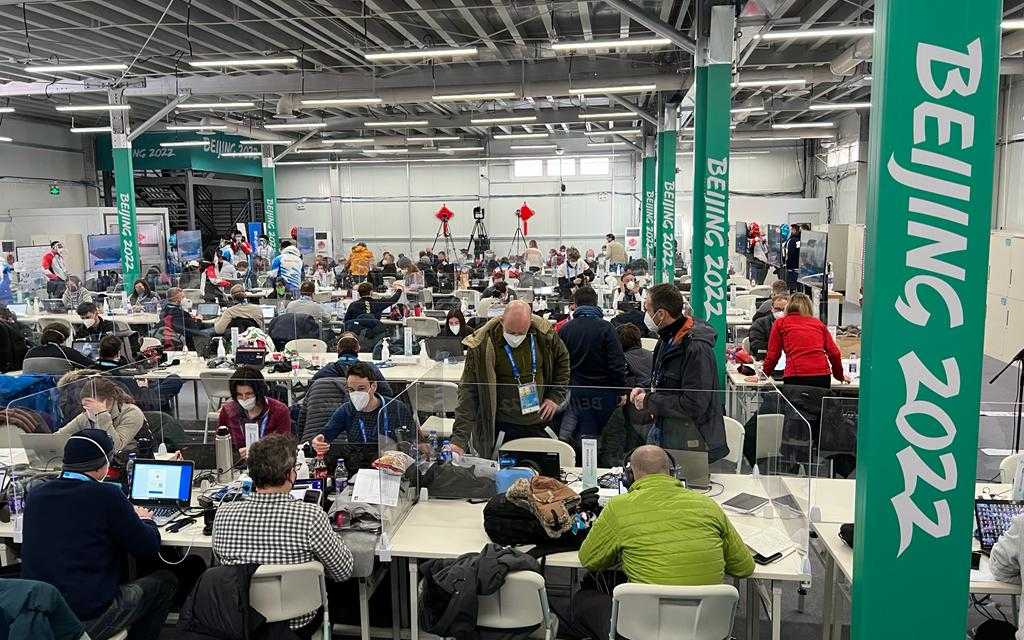The facilities at the Beijing 2022 Winter Olympic Games are all up to date and functional, which is great for the IOC, but the situation is not easy for journalists, and I will explain to you what the positive and negative points are. Until now, almost 2,000 journalists have arrived in Beijing, of the 2,800 accredited.
Main Press Center – The Main Press Center is very large, functional, has everything, even the special “visible” cabins to rest, an absolute novelty. It is certainly the largest ever. It is huge. The decentralized press centers are also well equipped, only the catering is not up to par.
Insufficient transportation The weak point of the whole organization is in transportation. We did not expect it. Covid has certainly complicated the situation and the plans of the organizers very much, but unfortunately they too have complicated their lives. For a long time, there had been discussions on the need to have direct bus transportation from Beijing to the other two competition centers, Yanqing and Zhangjiakou. They have relied on fast trains, excellent, but there are too many intermediate stops before and after the train stations where you have to make a forced stop, which extends the times in an incredible way. Then the times often do not coincide with our needs at the end of the races. For this reason I have sent a letter of protest to the Organizing Committee.
This is the letter
Beijing, February 6th 2022
Dear Big Xu,
There is no doubt that the pandemic has created so many problems for your organization. We know, moreover, that BOCOG did a lot to save the Games and to create a safe environment for the athletes and us. But now we are facing big problems with the transportation between the three clusters.
During the IOC Commission meetings, it was spoken about the necessity to study carefully the program and schedule of transportation in this special moment. Now the facts are speaking loud and clear: the organizing committee has not been able to imagine the difficulties and the real choices necessary to provide a working plan of transportation.
Your organization put in place a plan very complicated system, one that now means it will be difficult to find a solution. It looks as if too many hubs have been created and this it is not safe at all.
I give you examples:
- A journalist based in Beijing or in Yanqing cannot go to Zhangjiakou to follow the evening competitions. Why? Because he cannot go back to his hotel. Again, why? Because there is no longer transport available. It is even impossible to book a taxi. This is not acceptable. I can tell that we have experienced only one situation like this and it was in 1980 in Lake Placid, but after a few days a sufficient number of buses have arrived from New York to save the image of the Games.
- A journalist who has a hotel in Zhangjiakou has the same problem but in reverse – that is, to come back from Beijing and Yanqing. You cannot. And nobody can spend the night in the middle of nowhere, especially in the freezing nights.
The organizing committee has created an incredible infrastructure. It is managing the biggest challenge in the Olympic world. Now it risks to lose face because it is not able to solve a problem for which it ought not to be so difficult to find a solution.
To be clear: it is necessary to provide buses that go directly between the different press centers: Beijing, Yanqing and Zhangjiakou. Also, there should be no stopping in different hubs (to change vehicles).
Our protest it is very strong and will continue because it is not acceptable to work properly in these conditions, especially because we know your organizations is capable in all regards.
One more thing, of course. Big Xu, we know our Chinese friends intend to deliver only the best in world-class hospitality. And we are always in your service for your gracious oversight and friendship. We look forward to working together to solving this challenge. Together for a shared future!
Source: Gianni Merlo (AIPS President)

